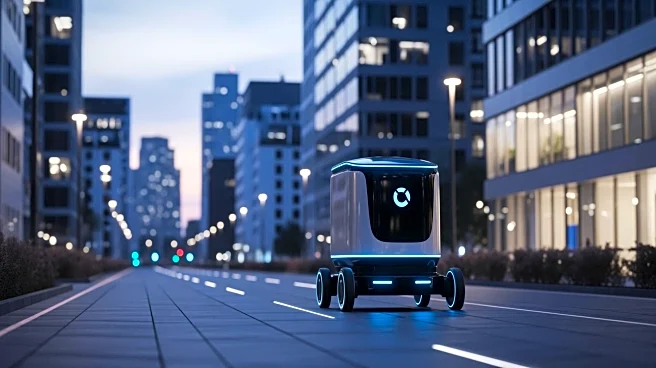What's Happening?
Starship Technologies Inc. has raised $50 million in Series C funding, increasing its total funding to over $280 million. The company plans to expand its robotic delivery services from over 60 U.S. university
campuses and more than 30 European cities to urban markets across North America. Founded in 2014 by Skype co-founders Ahti Heinla and Janus Friis, Starship has completed over 9 million deliveries with a fleet of more than 2,700 robots operating in 270+ locations across seven countries. The company claims to have built the largest autonomous delivery network globally, achieving over 8 million deliveries by April. Starship's robots operate at SAE Level 4 autonomy, offering a cost-efficient alternative to traditional delivery methods.
Why It's Important?
The expansion of Starship Technologies' autonomous delivery services could significantly impact urban logistics in the U.S. By introducing sub-30-minute delivery times, the company aims to set a new standard for consumer convenience. This development could disrupt traditional delivery services, potentially reducing costs and increasing efficiency in the last-mile delivery sector. The move also highlights the growing trend towards automation in logistics, which could lead to job displacement in traditional delivery roles. However, it also presents opportunities for technological advancements and new job creation in the field of robotics and AI.
What's Next?
Starship Technologies plans to use the new funding to increase its robot fleet from 2,700 to over 12,000 by 2027 and strengthen partnerships with major retailers. The company is working with U.S. states and U.K. local councils to ensure regulatory compliance and is focusing on enhancing customer acceptance of robotic deliveries. Starship is also investing in extending battery life, improving hardware and software services, and further increasing the autonomy of its robots. The company has already partnered with Grubhub in the U.S. and European platforms like Bolt and DoorDash’s Wolt.
Beyond the Headlines
The expansion of autonomous delivery services raises questions about regulatory challenges and public acceptance. As Starship Technologies navigates these issues, it must ensure safety and reliability in its operations. The company's focus on data-driven improvements in autonomy and edge computing highlights the importance of technological innovation in overcoming these challenges. Additionally, the shift towards automated deliveries could influence urban planning and infrastructure development, as cities adapt to accommodate new delivery technologies.










